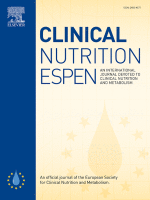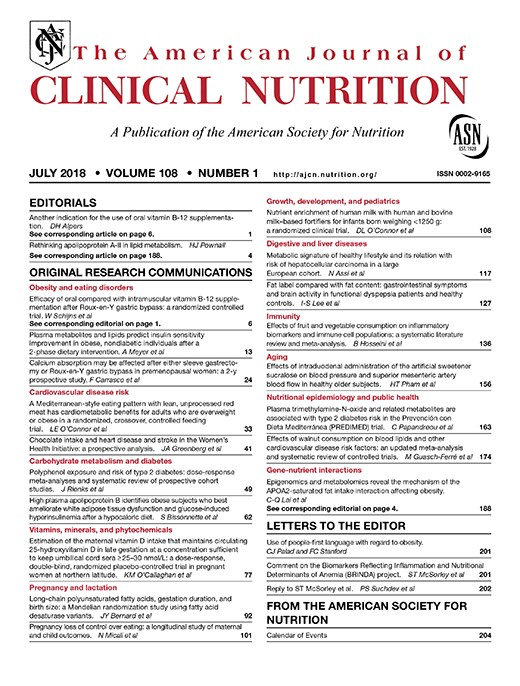Flow-Mediated Dilatation
How to submit an article:
- Registered users can submit any published journal article that has a unique DOI (Digital Object Identifier) name or link to Research Hub.
- For example, you can paste the full DOI link:
https://doi.org/10.1109/5.771073or just the DOI name:10.1109/5.771073into the field above and click submit. - The person who is first to submit a valid article to Research Hub will forever be credited for it, and every article submission earns you +6 Research Points.
Published research studies are articles that present the findings of original research that has undergone a peer-review process and has been made publicly available in scholarly journals, books or other media.

Effect of dark chocolate on flow-mediated dilatation: Systematic review, meta-analysis, and dose–response analysis of randomized controlled trials
2020 Apr Clinical Nutrition ESPEN Ebaditabar M, Djafarian K, Saeidifard N, Shab-Bidar S
Systematic Review Meta-Analysis Cardiovascular Disease Flow-Mediated Dilatation Dark ChocolateOur findings showing that chocolate and flavonoid intake significantly improves the flow-mediated dilatation, provide mechanistic evidence to support a causal link between chocolate and flavonoid intake and lowered CVD risk.

Clinical Evaluation of Blood Pressure Lowering, Endothelial Function Improving, Hypolipidemic and Anti‐Inflammatory Effects of Pomegranate Juice in Hypertensive Subjects
2013 Mar 21 Phytotherapy Research Asgary S, Sahebkar A, Afshani MR, Keshvari M, Haghjooyjavanmard S, Rafieian‐Kopaei M
Clinical Study High Blood Pressure Pomegranate HypolipidemicPomegranate juice intake for two weeks significantly reduces blood pressure and may improve heart health by lowering vascular endothelial adhesion molecule-1 levels.

Effects of chocolate, cocoa, and flavan-3-ols on cardiovascular health: a systematic review and meta-analysis of randomized trials
2012 Mar The American Journal of Clinical Nutrition Hooper L, Kay C, Abdelhamid A, Kroon PA, Cohn JS, Rimm EB, et al.
Systematic Review Meta-Analysis Diastolic Blood Pressure Dark Chocolate Insulin Resistance Cocoa Flow-Mediated DilatationRegular chocolate or cocoa consumption, rich in flavan-3-ols, has been associated with improved insulin resistance and blood vessel function, suggesting potential cardiovascular benefits.
Research insights are moderated by the Research Hub team and offer an at-a-glance overview of interesting research findings.

2020 Clinical Nutrition ESPEN
Our findings showing that chocolate and flavonoid intake significantly improves the flow-mediated dilatation, provide mechanistic evidence to support a causal link between chocolate and flavonoid intake and lowered CVD risk.
Systematic Review Cardiovascular Disease Dark Chocolate
Effect of dark chocolate on flow-mediated dilatation: Systematic review, meta-analysis, and dose–response analysis of randomized controlled trials
Ebaditabar M, Djafarian K, Saeidifard N, Shab-Bidar S

2013 Phytotherapy Research
Pomegranate juice intake for two weeks significantly reduces blood pressure and may improve heart health by lowering vascular endothelial adhesion molecule-1 levels.
Clinical Study High Blood Pressure Hypolipidemic Pomegranate
Clinical Evaluation of Blood Pressure Lowering, Endothelial Function Improving, Hypolipidemic and Anti‐Inflammatory Effects of Pomegranate Juice in Hypertensive Subjects
Asgary S, Sahebkar A, Afshani MR, Keshvari M, Haghjooyjavanmard S, Rafieian‐Kopaei M

2012 The American Journal of Clinical Nutrition
Regular chocolate or cocoa consumption, rich in flavan-3-ols, has been associated with improved insulin resistance and blood vessel function, suggesting potential cardiovascular benefits.
Systematic Review Cocoa Dark Chocolate Diastolic Blood Pressure Insulin Resistance
Effects of chocolate, cocoa, and flavan-3-ols on cardiovascular health: a systematic review and meta-analysis of randomized trials
Hooper L, Kay C, Abdelhamid A, Kroon PA, Cohn JS, Rimm EB, et al.
Review Articles
Review articles summarise and critically evaluate the current state of research on a specific topic or field by synthesising multiple primary research studies.

Effect of dark chocolate on flow-mediated dilatation: Systematic review, meta-analysis, and dose–response analysis of randomized controlled trials
2020 Apr Clinical Nutrition ESPEN Ebaditabar M, Djafarian K, Saeidifard N, Shab-Bidar S
Systematic Review Meta-Analysis Cardiovascular Disease Flow-Mediated Dilatation Dark ChocolateOur findings showing that chocolate and flavonoid intake significantly improves the flow-mediated dilatation, provide mechanistic evidence to support a causal link between chocolate and flavonoid intake and lowered CVD risk.

Effects of chocolate, cocoa, and flavan-3-ols on cardiovascular health: a systematic review and meta-analysis of randomized trials
2012 Mar The American Journal of Clinical Nutrition Hooper L, Kay C, Abdelhamid A, Kroon PA, Cohn JS, Rimm EB, et al.
Systematic Review Meta-Analysis Diastolic Blood Pressure Dark Chocolate Insulin Resistance Cocoa Flow-Mediated DilatationRegular chocolate or cocoa consumption, rich in flavan-3-ols, has been associated with improved insulin resistance and blood vessel function, suggesting potential cardiovascular benefits.
Clinical Trials
Clinical trials are research studies that involve people and are conducted to evaluate the safety and efficacy of new treatments or interventions, such as drugs, medical devices, or behavioural therapies.
Study Protocols
Published study protocols are detailed plans that outline the objectives, methodology, statistical analyses, and organisation of a research study that have been made publicly available for others to review and use as a reference.
Presentation Slides

Systematic Review
Our findings showing that chocolate and flavonoid intake significantly improves the flow-mediated dilatation, provide mechanistic evidence to support a causal link between chocolate and flavonoid intake and lowered CVD risk.
Ebaditabar M, Djafarian K, Saeidifard N, Shab-Bidar S

Clinical Study
Pomegranate juice intake for two weeks significantly reduces blood pressure and may improve heart health by lowering vascular endothelial adhesion molecule-1 levels.
Asgary S, Sahebkar A, Afshani MR, Keshvari M, Haghjooyjavanmard S, Rafieian‐Kopaei M

Systematic Review
Regular chocolate or cocoa consumption, rich in flavan-3-ols, has been associated with improved insulin resistance and blood vessel function, suggesting potential cardiovascular benefits.
Hooper L, Kay C, Abdelhamid A, Kroon PA, Cohn JS, Rimm EB, Cassidy A
Executive Summary
Write an executive summary in the form of a blog article on the topic of "Research into Chinese medicine treatment for Flow-Mediated Dilatation" summarising the research below and using language that can be easily understood by patients and avoiding medical jargon using a professional and caring tone of voice.
Write an executive summary in the form of a blog article on the topic of "Researched Chinese medicine treatments for Flow-Mediated Dilatation" summarising the research below in an objective and easy to understand way, and using language that can be easily understood by patients. Group the article into Chinese medicine treatments first, followed by nutrition and other treatments. Avoid using medical jargon and use a professional and caring tone of voice.
Write me a concise but easy to understand executive summary on the topic of "Chinese medicine treatments for Flow-Mediated Dilatation" based on the following research that I will give you. Your summary should be 2 paragraphs long in Australian English spelling and include references to the studies.
A Systematic Review published in 2020 in the journal Clinical Nutrition ESPEN found that Our findings showing that chocolate and flavonoid intake significantly improves the flow-mediated dilatation, provide mechanistic evidence to support a causal link between chocolate and flavonoid intake and lowered CVD risk. This meta-analysis identified 23 studies that randomly assigned participants to dark chocolate, cocoa, or flavonoid in comparison with control groups in acute or short-term chronic interventions. At the end of our meta-analysis, we found a protective effect of acute and chronic consumption of dark chocolate and flavonoids on FMD. Greater improvement was seen in higher doses (>20 day) of chronic consumption of dark chocolate with more than about one month. A non-linear effect of acute consumption of dark chocolate and flavonoids on FMD was also found.
A Clinical Study published in 2013 in the journal Phytotherapy Research found that Pomegranate juice intake for two weeks significantly reduces blood pressure and may improve heart health by lowering vascular endothelial adhesion molecule-1 levels. In the experiment, twenty-one hypertensive participants, aged between 30 to 67 years, were gathered and randomly assigned to consume either 150ml of fresh pomegranate juice per day or an equal quantity of water for a period of two weeks. The pomegranate juice was consumed in a single occasion between lunch and dinner. The blood pressure of these subjects, including systolic and diastolic pressures, were measured before and after the trial period. Additionally, levels of specific elements including lipid profile parameters, apolipoproteins A and B, intracellular adhesion molecule-1, vascular endothelial adhesion molecule 1, E-selectin, and other inflammatory and endothelial function biomarkers such as high-sensitivity C-reactive protein and interleukin-6, were also measured. The results showed that the consumption of pomegranate juice was associated with notable reductions in both systolic and diastolic blood pressures. The intake of pomegranate juice also resulted in a significant decrease in levels of vascular endothelial adhesion molecule 1, even though there was an increase in E-selectin levels. No observable influence appeared on the levels of intracellular adhesion molecule-1, high-sensitivity C-reactive protein, lipid profile parameters, apolipoproteins, or interleukin-6 from the juice consumption, indicating that pomegranate juice may specifically target certain elements related to heart health.
A Systematic Review published in 2012 in the journal The American Journal of Clinical Nutrition found that Regular chocolate or cocoa consumption, rich in flavan-3-ols, has been associated with improved insulin resistance and blood vessel function, suggesting potential cardiovascular benefits. The study systematically reviewed 42 randomized controlled trials involving 1297 participants to investigate the impact of chocolate, cocoa, and flavan-3-ols on major cardiovascular disease risk factors. Utilizing a comprehensive search across multiple databases, the researchers conducted meta-analyses, assessing acute and short-term chronic interventions. Results revealed consistent improvements, including reduced insulin resistance (HOMA-IR), enhanced flow-mediated dilatation (FMD), and favorable effects on blood pressure and cholesterol levels. The findings indicate promising cardiovascular benefits associated with chocolate or cocoa consumption. Notably, the study highlights improvements in insulin sensitivity, blood vessel function, and blood pressure, emphasizing the potential positive impact of flavan-3-ols found in these products.
Moderation Tools
Topic
Sign In
Users not signed in are limited to viewing the 5 most recent items of content.